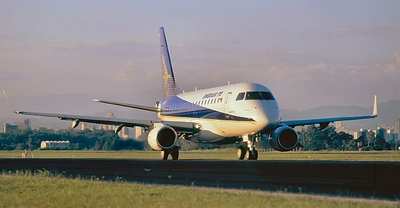Tue, Sep 06, 2011
Program Benchmarks Performance Of E-Jets And CF34-8E Engines
Powered With Sustainable HEFA Biofuel
Embraer and GE recently conducted a series of test flights with
an Embraer 170 jet flying from the Company's Gaviao Peixoto
facilities. The purpose of the tests was to benchmark the
operational characteristics of the airplane and its GE CF34-8E
engines when powered by HEFA (Hydro-processed Esters and Fatty
Acids) fuel under a broad range of unique flight conditions. The
flights involved powering one of the two GE engines with the
maximum ASTM permissible mix of 50% HEFA (derived from camelina)
with Jet-A.
Embraer 170 File Photo

Following the recent approval of biomass-based HEFA fuels by
ASTM, Embraer and GE have stepped up their efforts with the
objective of supporting the development of a broader range of
sustainable biofuels for aviation. With these tests, both companies
confirmed that technical plans and procedures for future fuels
testing are robust, enabling value-added and timely testing of
additional fuels.
"We have a strong and longstanding commitment to developing
efficient and environmentally responsible products. This series of
tests, and their very positive results, gives us a lot of new
information to continue our sustainability program as it relates to
future products," said Mauro Kern, Embraer Executive Vice President
of Engineering and Technology. "Supporting the development and
deployment of sustainable aviation biofuels is one of the
industry's top priorities, and we are firmly engaged in that
effort."
The series of flights, which happened in August 2011, set the
stage for further biofuel development programs that Embraer and GE
will undertake with fuel produced from additional feedstocks and
production pathways under consideration by the industry. These
fuels are currently under study by fuel providers worldwide,
including many in Brazil.

"Embraer and GE plan to engage in
future biofuel testing and ASTM substantiation activities. This
could encompass a broad range of pursuits, from testing of
additional fuel production pathways and feedstocks, to potentially
increasing HEFA blend levels," said Laurent Rouaud, Chief Marketing
Office, GE Aviation. "These flights have also demonstrated that the
aircraft and engine manufacturers are also interested in limiting
net carbon emissions from their ongoing product development
activities, and in working with producers to establish early
production demand for the benefit of the entire aviation
enterprise."
More News
Pilot Also Reported That Due To A Fuel Leak, The Auxiliary Fuel Tanks Were Not Used On June 4, 2025, at 13:41 eastern daylight time, a Piper PA-23, N2109P, was substantially damage>[...]
Have A Story That NEEDS To Be Featured On Aero-News? Here’s How To Submit A Story To Our Team Some of the greatest new stories ANN has ever covered have been submitted by our>[...]
From 2023 (YouTube Edition): Reflections on War’s Collective Lessons and Cyclical Nature The exigencies of war ought be colorblind. Inane social-constructs the likes of racis>[...]
Aero Linx: Colorado Pilots Association (CPA) Colorado Pilots Association was incorporated as a Colorado Nonprofit Corporation in 1972. It is a statewide organization with over 700 >[...]
High Speed Taxiway A long radius taxiway designed and provided with lighting or marking to define the path of aircraft, traveling at high speed (up to 60 knots), from the runway ce>[...]
 NTSB Prelim: Piper PA-23
NTSB Prelim: Piper PA-23 ANN FAQ: Submit a News Story!
ANN FAQ: Submit a News Story! Classic Aero-TV: One Mans Vietnam
Classic Aero-TV: One Mans Vietnam ANN's Daily Aero-Linx (07.03.25)
ANN's Daily Aero-Linx (07.03.25) ANN's Daily Aero-Term (07.03.25): High Speed Taxiway
ANN's Daily Aero-Term (07.03.25): High Speed Taxiway




